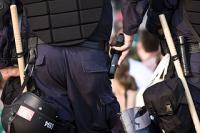-
U.K. attacks ISIS oil targets in first British military action in Syria

In the first British military strikes in Syria, four British Tornados have dropped precision munitions on seven ISIS targets in eastern Syrian. All of the targets were part of the Islamist organization’s oil production and distribution system. The planes left on their mission from the RAF Akrotiri airbase in Cyprus less than an hour after the House of Commons authorized a U.K. military campaign to destroy ISIS targets in Syria. The United Kingdom has already been part of the U.S.-led coalition against ISIS, but British military strikes were limited to attacking ISIS targets in Iraq.
-
-
45% increase in death by law enforcement in U.S. between 1999 and 2013

Between 1999 and 2013 in the United States, between 279 (in 2000) to 507 (in 2012) people were killed each year by legal intervention or law enforcement, other than by legal execution — a 45 percent increase, mostly among non-whites. In 2013 an estimated 11.3 million arrests in the United States resulted in approximately 480 deaths from legal intervention. Between 1999 and 2013 there were 5,511 deaths by legal intervention.
-
-
Large-scale face-search technology helps in fighting crime, terrorism

The rapid growth in surveillance cameras is resulting in millions of face images and videos captured every day. The ability quickly and accurately to search all these images to assist in identifying criminal and terrorism suspects is an important and complex task that can contribute to making communities safer. To help in this effort, MSU has licensed its large-scale, automatic face-search system to NEC Corp.
-
-
Syria is continuing to use chemical weapons against its people: Diplomats
Diplomats attending the annual meeting of the Organization for the Prohibition of Chemical Weapons (OPCW) in The Hague, on Monday accused Syrian president Bashar al-Assad of continuing to use deadly gas munitions against his own people, although Syria committed to dismantle and remove all of its stocks of chemical weapons. U.S. and EU representatives charged that the regime may still has in its possession large quantities of chemical armaments like sulfur mustard and sarin, which it has concealed from international inspectors.
-
-
NSA’s bulk metadata collection program ends
The NSA on Sunday ended its controversial surveillance program, initiated by the George W. Bush administration in 2006, which collected the metadata of all communications in the United States. The creation of the bulk collection program was the result of criticism by the 9/11 Commission, and many security experts, who argued that the information about the nineteen 9/11 terrorists was available, but that law enforcement and intelligence agencies lacked structure and procedure which would have allowed them to “connect the dots.”
-
-
Israel-Russia communication: Straying Russian plane avoid being shot down

Israel defense minister, Moshe Ya’alon, on Sunday told reporters that a Russian jet recently entered Israeli airspace but was not shot down because Israel and Russia had established an effective open communication system between the two countries. Ya’alon said the plane, by mistake, entered about one mile into Israeli airspace and immediately turned around back to Syria when the Russians were notified.
-
-
Turkey’s, Russia’s official versions of jet shoot down scientifically impossible: Physicists
Two astrophysicists show that the official versions of both Turkey and Russia about the circumstances surrounding the shooting down of a Russian fighter jet over Turkey should be taken with a grain of salt. Turkey’s insists that the Russian jet flew over Turkish territory for 17 seconds, but this is contradicted by the video of the shooting provided by the Turkish military. Russia’s claims that the jet made a 90-dgree turn in order to avoid Turkish airspace does “not correspond to the laws of mechanics.”
-
-
New technique can tell whether a fingerprint belongs to a male or female

Culprits beware: researchers are taking crime scene fingerprint identification to a new level. They have discovered a straightforward concept for identifying whether a culprit is male or female. It is based on the content in fingerprints — specifically amino acids. Amino acid levels in the sweat of females are about twice as high as in males. There is also a slightly different distribution, due mostly to hormonal differences. The same is true for amino acids left behind in fingerprints.
-
-
New sensors detect cable fire before it starts burning
Fires are frequently caused by smoldering cables. New sensors now help detect such smoldering fires at an early stage by analyzing the plastic vapors released by overheated insulating cables. Scientists have developed these hybrid sensors that combine measurement processes with data evaluation. These detect the gases released from the plastic coating due to heating and reliably identify and analyze the gas mixture and its concentration.
-
-
NYPD commissioner to Congress: Do not allow people on terror watch list to buy guns
NYPD Commissioner Bill Bratton the other day called on Congress today to “start getting serious” about fixing the loophole which allows individuals on the U.S. terror watch list legally to purchase firearms in the United States. Bratton said: “If Congress really wants to do something instead of just talking about something, help us out with that terrorist watch list, those thousands of people that can purchase firearms in this country. I’m more worried about them than I am about Syrian refugees.”
-
-
N.Y. State Police app helps citizens report suspicious activity
The New York State Police is urging citizens to download a new digital app which allows citizens to capture and report suspicious activity with their smart phones. The app is part of the “See Something, Send Something” campaign which aims to turn willing citizens into the eyes and ears of law enforcement. For example, if a citizen notices an unattended package at a train station of an airport, they could use the app to alert law enforcement.
-
-
Tech companies: weakening encryption would only help the bad guys
Leading technology companies — Apple, Microsoft, Google, Samsung, Twitter, Facebook, and fifty-six other technology companies — have joined forces to campaign against weakening end-to-end encryption, insisting that any weakening of encryption would be “exploited by the bad guys.” Apple’s chief executive Tim Cook recently asserted that “any backdoor is a backdoor for everyone.”
-
-
After Paris, it’s traditional detective work that will keep us safe, not mass surveillance
Before the dust has even settled from the attacks on Paris, familiar calls for greater surveillance powers are surfacing. The desire for greater security is understandable, but that doesn’t mean we should suspend our judgement on the measures proposed to bring it about. It’s widely accepted that intelligence work is the most effective form of counter-terrorism, and that the best intelligence comes from community engagement, not coercion. So we must be wary of the evangelism of those pushing technological solutions to security problems, and the political clamor for mass surveillance.
-
-
ISIS “trying to obtain chemical, nuclear weapons”: U.K. government
British prime minister David Cameron said yesterday that the government security review has warned that ISIS and al-Qaeda are trying to get their hands on chemical and nuclear weapons. Cameroon referred to the security review in a speech in which he called on Members of Parliament to approve U.K. air strikes in Syria within a week. The British government pledged allocation additional resources for new equipment and the creation of within the Army of two new rapid response “strike brigades” of 5,000 soldiers each. The number of civilian jobs in the Ministry of defense, though, will be heavily reduced.
-
-
Smart sensor detects single molecule in chemical compounds
Researchers have developed a smart sensor that can detect single molecules in chemical and biological compounds — a highly valued function in medicine, security, and defense. The researcher used a chemical and biochemical sensing technique called surface-enhanced Raman spectroscopy (SERS), which is used to understand more about the make-up of materials.
-
More headlines
The long view
Are We Ready for a ‘DeepSeek for Bioweapons’?
Anthropic’s Claude 4 is a warning sign: AI that can help build bioweapons is coming, and could be widely available soon. Steven Adler writes that we need to be prepared for the consequences: “like a freely downloadable ‘DeepSeek for bioweapons,’ available across the internet, loadable to the computer of any amateur scientist who wishes to cause mass harm. With Anthropic’s Claude Opus 4 having finally triggered this level of safety risk, the clock is now ticking.”
“The Federal Government Is Gone”: Under Trump, the Fight Against Extremist Violence Is Left Up to the States
By Hannah Allam
As President Donald Trump guts the main federal office dedicated to preventing terrorism, states say they’re left to take the lead in spotlighting threats. Some state efforts are robust, others are fledgling, and yet other states are still formalizing strategies for addressing extremism. With the federal government largely retreating from focusing on extremist dangers, prevention advocates say the threat of violent extremism is likely to increase.
Luigi Mangione and the Making of a ‘Terrorist’
Discretion is crucial to the American tradition of criminal law, Jacob Ware and Ania Zolyniak write, noting that “lawmakers enact broader statutes to empower prosecutors to pursue justice while entrusting that they will stay within the confines of their authority and screen out the inevitable “absurd” cases that may arise.” Discretion is also vital to maintaining the legitimacy of the legal system. In the prosecution’s case against Luigi Mangione, they charge, “That discretion was abused.”
Autonomous Weapon Systems: No Human-in-the-Loop Required, and Other Myths Dispelled
“The United States has a strong policy on autonomy in weapon systems that simultaneously enables their development and deployment and ensures they could be used in an effective manner, meaning the systems work as intended, with the same minimal risk of accidents or errors that all weapon systems have,” Michael Horowitz writes.
Ukraine Drone Strikes on Russian Airbase Reveal Any Country Is Vulnerable to the Same Kind of Attack
By Michael A. Lewis
Air defense systems are built on the assumption that threats come from above and from beyond national borders. But Ukraine’s coordinated drone strike on 1 June on five airbases deep inside Russian territory exposed what happens when states are attacked from below and from within. In low-level airspace, visibility drops, responsibility fragments, and detection tools lose their edge. Drones arrive unannounced, response times lag, coordination breaks.
Shots to the Dome—Why We Can’t Model US Missile Defense on Israel’s “Iron Dome”
By Justin Logan
Starting an arms race where the costs are stacked against you at a time when debt-to-GDP is approaching an all-time high seems reckless. All in all, the idea behind Golden Dome is still quite undercooked.
